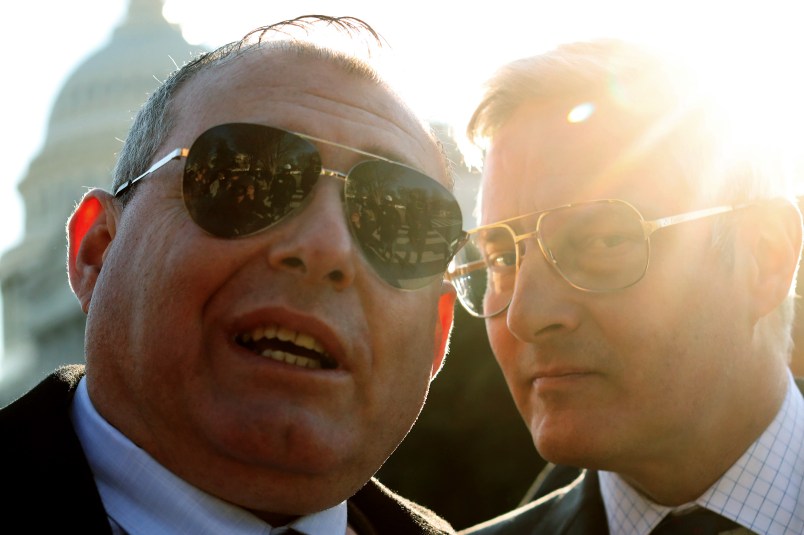NEW YORK — Tempers flared at a Thursday hearing in the prosecution of Lev Parnas, as an attorney for the former friend of Rudy Giuliani’s was accused of ethical misconduct.
The hearing, held in Manhattan federal court, dealt with two issues sparked by Parnas’s ongoing campaign to transfer evidence in his case to the House Intelligence Committee.
The first issue came up after Manhattan federal prosecutors tried to block Parnas from transferring his iCloud account, which they had gained access to through discovery, to the House Intelligence Committee. Prosecutors argued that Apple, and not Parnas, had generated the material that they had access to. The second issue exposed a rift between Parnas and his longtime associate Igor Fruman, whose attorney Todd Blanche was visibly annoyed that potentially privileged information in the case may have been transferred to Congress.
Parnas and Fruman were indicted in October, along with two associates, on campaign finance charges.
The first issue, involving the Manhattan feds, was dispatched very quickly. Just before the hearing began, Parnas attorney Joseph Bondy, wearing an American flag pin on the lapel of his jacket, approached prosecutors and told them something, eliciting grins from the government.
But it wasn’t until District Judge Paul Oetken for the Southern District of New York arrived that it was clear what had happened. According to Assistant U.S. Attorney Douglas Zolkind, Bondy had told the government just before the hearing began that he had been unaware that it was possible for Parnas to access his own iCloud account because he was the account holder; Bondy was able to download the iCloud account’s contents — he didn’t need the government to hand them over. Zolkind explained that Bondy would do so, and that he plans on transferring the materials to the House.
“We will withdraw our request,” Bondy said. “Younger people in my office identified that we can do this.”
Prosecutors also said that the iPhones seized from Parnas may yet have “additional material” that has not been extracted or provided to the House.
With one half of the hearing’s rationale rendered moot, the hearing moved on to a dispute between Fruman and Parnas.
Blanche, Fruman’s attorney, accused Bondy of blithely handing over material to the House Intelligence Committee without checking whether any documents contained within might be protected by Fruman’s attorney-client privilege.
This could be extremely relevant to the case, Blanche explained: Fruman and Parnas hired a lawyer after the Federal Election Commission opened an investigation into a $325,000 contribution they made to a pro-Trump Super PAC. The pair’s indictment deals in part with that same contribution.
Bondy replied that, because of the impeachment inquiry, typical privilege rules did not apply. He also alluded to a Nov. 5 meeting in which he told Blanche that Parnas intended to comply with the subpoena.
“Our paths diverged,” Bondy said, suggesting that that was the time to raise any privilege concerns.
At one point, Bondy brought up his request that Attorney General Bill Barr recuse himself from the case. Nobody else subsequently addressed it.
The conversation continued to deteriorate, with Blanche telling Bondy that he wasn’t “permitted under the rules for attorneys” to release privileged material of a third party.
“I don’t believe I’ve breached any rule of ethics,” Bondy replied.
Judge Oetken ordered Bondy to ask the House Intelligence Committee not to release publicly documents relevant to the names of a few attorneys and law firms that present privilege risks.
Oetken also noted that only a “tiny percentage” of what Bondy gave to the House has so far been released to the public.






